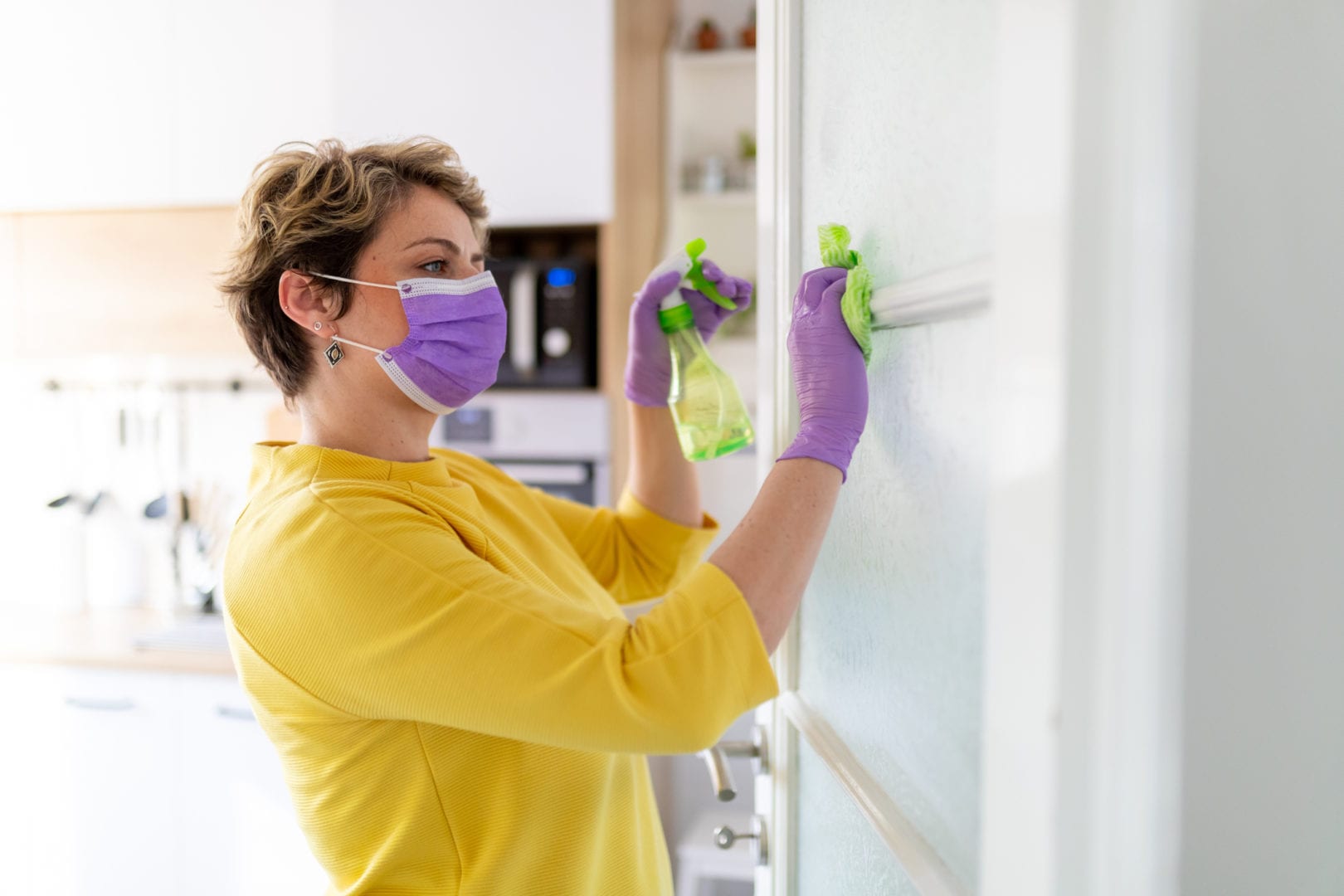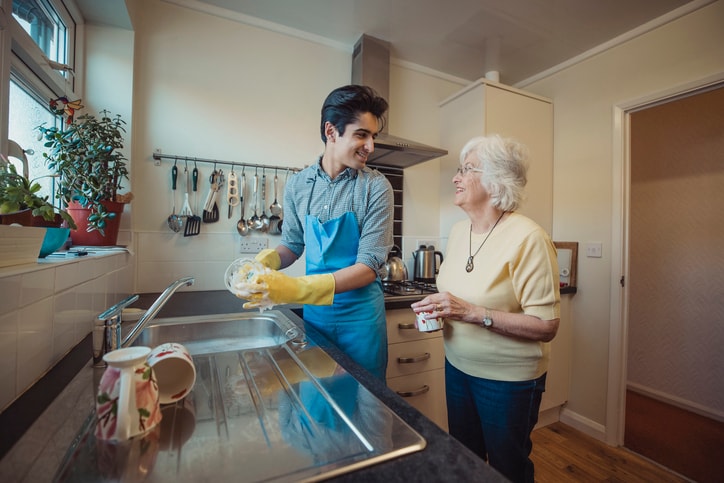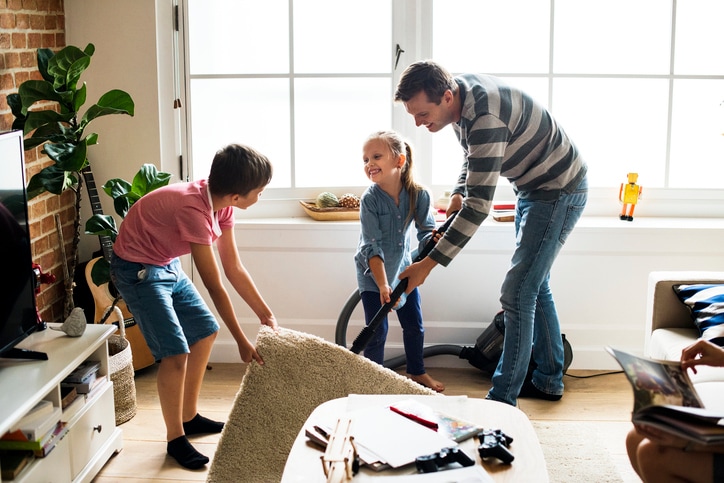Raise your hand if you could use some help around the house these days. (Cue millions of hands.) Whether you’re working and/or schooling at home, you’re an essential worker or you’re going back to your workplace and swamped trying to catch up, you may save yourself some stress by hiring a house cleaner to take on some household to-dos.
Scheduling a housekeeper could translate to a great deal of relief — not to mention the gift of time — for many people, says Claire Zeysing, CEO of Make It Shine, a home cleaning company in Las Vegas.
But, while COVID-19 is still a concern (and it will be for a while), you might be wondering how you’ll know it’s safe to have a house cleaner working in your home and what safety precautions you should be taking.
When will it be safe to bring a house cleaner in?
When it comes to the right time to bring a house cleaner in, there’s no one answer, since every area and personal situation is completely unique. So you’ll want to make the decision carefully based on several different factors, including:
-
State and local stay-at-home guidelines: Check your area’s official restrictions and recommendations to see whether stay-at-home orders have been lifted and for whom. Know that lifted orders could be put back in place if there’s a spike in cases, so keep checking back.
-
Your own personal comfort level: There’s an element of trust in bringing someone into your home, especially right now. You’ll want to feel that you and your family are safe and that the cleanings will actually relieve any stress, rather than causing or increasing it.
-
Your and your family’s health status: If you or a loved one is high-risk for COVID-19 complications, you might think twice about having a cleaner come in right now — or, if you’re unsure about your unique case, consult your healthcare provider. Furthermore, if anyone in your direct circle is or has recently been sick with the virus, you shouldn’t risk exposing your cleaners. “Upon confirming their scheduled appointment, we respectfully ask our customers if they have been sick in the past 48 hours in order to protect our employees,” says Zeysing. We recommend giving an even wider berth — at least 10 days from having any symptoms of illness — due to Centers for Disease Control & Prevention (CDC)’s guidelines. If you’ve been diagnosed with COVID-19, check with your doctor to ensure you’re no longer contagious first.
What should I discuss with the house cleaner before scheduling an appointment?
Before having anyone in your home, you should know and understand COVID-19 symptoms, how it’s spread and how to prevent contracting and transmitting it. You should also talk over specifics with the cleaners in advance.
“Having an open, transparent line of communication remains key between the customer and the cleaning company or independent cleaner,” says Zeysing.
They should be able to tell you exactly how they’re keeping themselves, any employees and their customers safe.
“We’ve had to make adjustments to our business, such as screening our employees on their recent health conditions and wearing a mask and gloves before entering a customer’s house,” says Zeysing, for example.
Val Oliveira, founder of Val’s Services, a Chicago-based cleaning and organizing company, stresses the importance of cleaners following and training their employees in the CDC’s guidelines for cleaning and disinfecting.
As for cleaning practices, it’s likely their methods won’t need to change much. Jay Varkey, associate professor of medicine and senior physician at Emory University School of Medicine, has experience in creating COVID-19 safety protocols. He stresses the importance of making sure surfaces and other high-touch areas, like countertops, doorknobs and faucet handles, are cleaned. Those are likely already part of a cleaning company’s checklist, but it’s extra important that they not miss any of them now.
“SARS-CoV-2, the virus that causes COVID-19, denatures very readily with household disinfectants or with soap and water or alcohol,” says Varkey. In other words, your cleaning crew likely won’t need to change cleaning products from what they were using before the virus hit. Check this list of recommended disinfectants from the Environmental Protection Agency (EPA) to be sure.
What safety precautions should we all be taking to protect everyone?
Your cleaners should be taking precautions to keep you safe, and you should be taking precautions to keep them safe as well. This includes:
-
Physical distancing: It’s ideal if you leave your home while your cleaners are inside, says Varkey. But if that’s not an option, do your best to stay at least six feet away from them, and even better, in a different room while they’re in your home.
-
Safety gear: “Wearing masks and gloves is definitely part of the safety precautions all house cleaners should be taking right now; it is the minimum requirement,” says Zeysing. “The use of personal protective equipment (PPE) is essential for our cleaners and like other businesses, we plan to provide our employees with PPE.” You should wear a mask, too, if you’re staying in the home during the cleaning, says Varkey. “The whole concept is that my mask protects you, and your mask protects me,” he explains.
-
Avoiding cross contamination: Many house cleaners go from home to home to perform their services. It’s important that they’re not carrying germs from one to the next. So it’s good practice for them to wipe down bottles, carts and anything else they’re transporting before moving on to the next home. Zeysing even has her cleaning crew wear disposable booties over their shoes, and Oliveira’s team switches out sponges, dusters and microfiber mop refills before moving to the next home. “That’s not a major way that this virus is passing from place to place, but it’s a good practice,” says Varkey. You may want to provide your own cleaning products and tools, like a vacuum or sponges, to be extra cautious.
-
Practice handwashing: Everyone should be practicing frequent handwashing and avoiding touching their face to prevent the spread of COVID-19, says Varkey. These practices can help you protect yourself and your house cleaner. Wash your hands before the cleaner arrives and after they leave, or if you’re leaving during the cleaning, wash your hands before you exit your home and as soon as you re-enter.
While this advice may help you feel more prepared and at ease in making the decision about when to have a cleaner come into your home, you do need to make the choice that’s right for your personal situation. If and when you’re ready, a professional cleaning may be just what you need.
“Most people have never spent this much time in their homes, and overnight, we’ve all had to makeshift an office space for work and online homeschooling,” points out Zeysing. “It requires space and time to clean, and by hiring a cleaner, it can help alleviate some of that stress and anxiety.”


